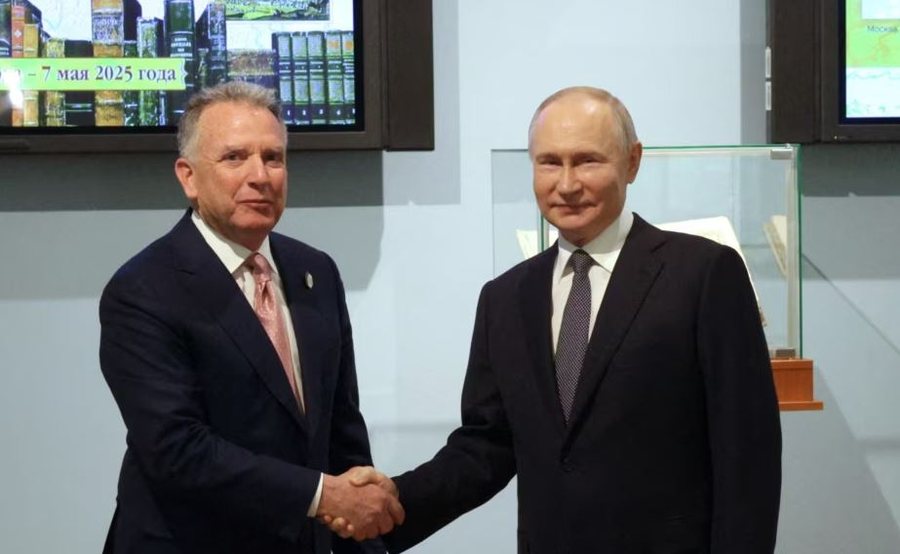
The White House's top envoy for Russia is expected to hold talks in Moscow with Russian President Vladimir Putin, with a peace proposal that would constitute a major shift in American policy: recognition of Moscow's claim to Crimea, Ukrainian territory.
The proposal, which was initially circulated by US officials after talks in Paris last week, is one of several topics that Steve Witkoff is expected to raise in his meeting with Putin on April 25.
As Russia's war against Ukraine has now entered its fourth year, this plan represents a major effort by Washington to unblock the diplomatic deadlock and stop the largest land war in Europe since World War II.
This is also a profound shift in American policy, especially regarding the status of Crimea, which Moscow invaded and then annexed in 2014.
Except for a very small number of states, the annexation has not been recognized internationally. Since then — including during the first Trump administration — American policy has rejected the Russian claim.
A European diplomat with knowledge of the details of the plan described it to Radio Free Europe. A former American diplomat also confirmed the content of the proposal.
Regarding Crimea, the American plan calls for "de jure" — that is, legal — recognition of Russia's claim to the peninsula.
In addition to representing a major turnaround for the United States, this would be a tremendous victory for Putin, whose popularity rose sharply within Russia after his order for the covert invasion of Crimea in 2014 and subsequent annexation.
US recognition would be a severe blow to Ukrainian President Volodymyr Zelensky and to most Ukrainians, for whom the Russian claim is part of a broader campaign to undermine Ukraine's sovereignty and independence.
After the US proposal began circulating in Paris last week, Zelensky made it clear, both in public statements and in private meetings, that he would categorically reject the recognition of Crimea as Russian territory. As a result, US Secretary of State Marco Rubio abruptly withdrew from follow-up talks that were expected to be held in London on April 23.
"There is nothing to talk about. It is our land, the land of the Ukrainian people," Zelensky declared on April 23.
That same day, in a social media post, President Trump — who has had a complicated relationship with Zelensky and a much warmer one with Putin — suggested there was room for flexibility on the part of the Ukrainian government if the American proposal moves forward.
He also said that Ukrainians should have fought for Crimea when Russia invaded it in 2014.
"No one is asking Zelensky to recognize Crimea as Russian territory, but if he loves Crimea, why didn't they fight for it eleven years ago when it was handed over to Russia without a shot being fired?" Trump wrote.
Other elements of the US plan include blocking Ukraine's aspirations for membership in the North Atlantic Treaty Organization (NATO) and a "de facto" recognition of Ukrainian territories currently under Russian control, including parts of the Donetsk, Luhansk, Kherson and Zaporizhia regions.
The plan also envisages returning the occupied parts of the Kharkiv region to Ukrainian control; guaranteeing Ukraine unrestricted access to the Dnieper River; and returning the Zaporizhia nuclear power plant to Ukrainian administration, on the condition that it would then be operated by the US, which would provide energy for both Ukraine and the areas occupied by Russia.
Excluding NATO membership remains another sensitive point for Ukraine, where this objective is sanctioned in the Constitution.
According to the European diplomat, one element of the American plan that has not been widely publicized is the US withdrawal from the demand that Zelensky hold new presidential elections as soon as possible.
Zelensky was elected in 2019 with an overwhelming majority. But the Kremlin has declared his mandate illegitimate, as the state of war, declared after the Russian invasion in February 2022, has prevented new elections from being held.
In a public clash earlier this year, Trump appeared to accept the Russian allegations, calling Zelensky a "dictator" and demanding new elections.
Trump has since toned down his rhetoric about the election. However, the Ukrainian government has quietly begun preparations for the possibility of holding the vote later this year.
"Putin is being offered almost everything he wanted to get, while Ukraine is being offered almost nothing; there is no compromise," Ukrainian military analyst Oleksandr Khara told Current Time.
"The fact that Russia is not able to occupy all of Ukraine or change the government there is perfectly clear, and that will not change anytime soon," he added.
"The Russian advance in the east is coming at a high cost, and this does not imply any real prospect of military victory over Ukraine. But in Trump's mind there is a completely different reality."/ REL (A2 Televizion)











